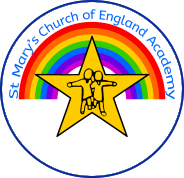Reading Curriculum Statement
Intent
At St. Mary’s Academy, we believe that reading is an essential life skill that enables children to:
* Learn new things;
* Explore and understand the world around them;
* Share in cultural experiences;
* Develop their imagination;
* Increase confidence;
* Communicate effectively with others.
We believe that reading is the key to being able to access the wider curriculum and aim to foster a lifelong love of reading, striving to ensure that all of the children who attend our school become fluent, confident, enthusiastic readers by the end of their primary education.
Implementation
Phonics:
In Early Years and Key Stage 1, the development of reading begins with the systematic and rigorous teaching of daily phonics. At St Mary’s Academy, we use the DfE endorsed programme “Sounds-Write”.
Each daily phonics lesson is 30 minutes long and follows a 3-part structure: Review; Teach; Read/Write in connected text. Every lesson gives the children the opportunity to apply their acquired code knowledge into reading and writing. Fidelity to the script ensures that phonics teaching is consistent and children make progress. Teachers monitor the children closely, offering additional support where needed so that no child is left behind. As a school we are committed to ensuring that children leave Early Years with a solid foundation in the initial code and that by the end of Year 2, every child is a reader.
Daily phonics sessions carry on into Lower Key Stage 2 as needed.
Early Reading:
Reading books at this point are closely aligned to each child’s phonics stage, allowing children to practise and apply their phonics knowledge. Children are also encouraged to take a ‘reading for pleasure’ book home – this may be a book that they can share with an adult which enables children to hear what reading is like and exposes them to a greater range of vocabulary and genres.
As well as one to one reading in school, there are also guided and shared reading sessions, where skills for reading and comprehending are covered. The children have daily class novel time where the class teacher models what being a reader looks like and shares a love of reading.
Further Reading:
As the children develop their reading skills, they are asked to complete Star Reader tests (on a termly basis) in order to determine their Zone of Proximal Development (ZPD). The ZPD is a range of book levels that are recommended for each child to provide optimal level of challenge in order to maintain progress. When they have finished reading a book, the children are asked to complete an Accelerated Reader quiz which helps to monitor their understanding of the books they read. The aim is to achieve an average of 85% accuracy or above. The children are able to choose their own books within the ZPD, and regularly discuss their choices with a member of the year group team. Guided and shared reading sessions continue, along with daily class novel reading.
Again, the children are able to choose a ‘reading for pleasure’ book which may be a book of a higher level to share with an adult at home or may be linked to an area of interest.
Home Reading:
Reading at home is expected 5 times a week and all of the children have a reading record that is checked regularly by year group staff. Parents/carers are asked to comment and sign in the reading record every time they read with their child at home. There are specific reading records for Early Years/Year 1, Year 1 & 2, Year 3 & 4, Year 5 & 6. The middle section of the record contains helpful information for the adult – phonics, focus words for reading and spelling for each year group, grammar expectations and questions that can be asked about books that have been read. Home reading is recorded in class and scores are added to the weekly ‘Paddington Race to Read’ to see which class has read the most that week.
Impact
Reading success is measured through the following:
* Termly phonics assessments across Early Years, Key Stage 1 and Lower Key Stage 2.
* Tracking of home reading records.
* Weekly tracking of Accelerated Reader quiz scores.
* Termly standardised reading tests – SATs practise papers in Year 6; Progress in Reading Assessments (PiRA) in Years 1-5.
* Termly Star Reader Tests – standardised score and reading age.
In addition, evidence from reading sessions in school is used to identify gaps and plan subsequent lessons.
Accelerated Reader
SORA App
